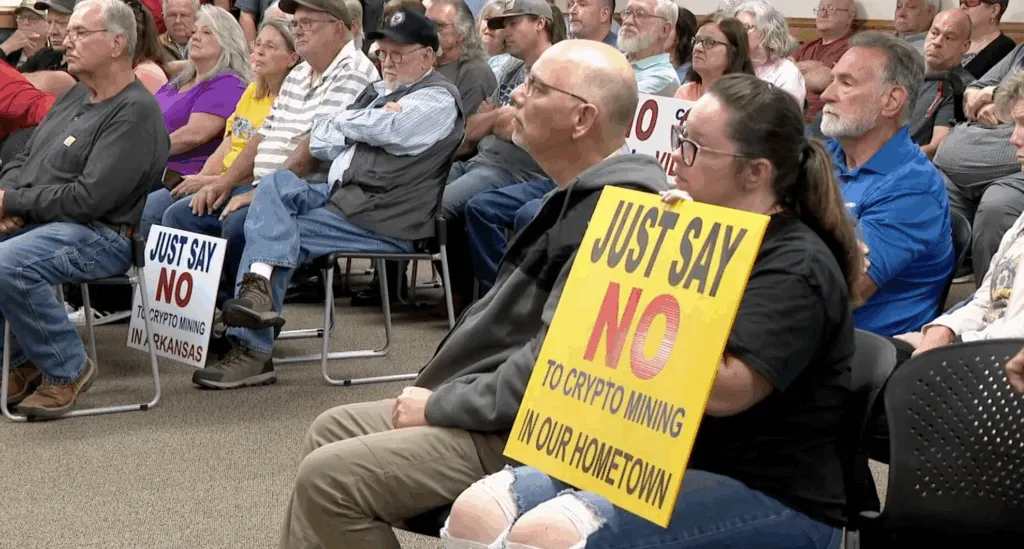|
Getting your Trinity Audio player ready...
|
A small town in central Arkansas has rejected plans to develop a BTC block reward mining operation, citing noise pollution and strain on the local grid.
The planning commission in Vilonia, a town in Faulkner County, voted unanimously against plans to establish the mining operation last week. The vote followed incessant opposition by the local community against the operation, which they say would have come at a significant cost to the town’s environment and the health of its people.
“We are Arkansas the natural state, not Arkansas the Bitcoin state,” one resident told the commission, as reported by local outlet THV11.

The operation was to be financed by Interstate Holdings, a company based in Florida and owned by Arkansas auto businessman Steve Landers Jr. Interstate had partnered with the Arkansas Blockchain Council, but even this wasn’t enough to sway the locals.
“This is going to be even quieter, because it’s inside of a building. It’s not an issue with sound or water or critical energy,” Landers defended the planned operation.
“It will exist and no one will know it’s there unless you [already] knew it was there.”
In support of the BTC mine, the Council’s president, Ben Smith, appealed to the residents’ entrepreneurial spirit, stating that it would attract millions of dollars to Vilonia. He estimated that the entire operation would cost over $14 million, most of which would be invested in the community.
However, the residents stood their ground. Local leaders have also opposed the mining proposal in solidarity with the electorate.
“Unless there is a clear change in sentiment from the citizens whom I represent, if this matter comes before me I plan to exercise the powers granted to me by this community and vote against the cryptomine proposal,” Vilonia city councilman Mike Matos told one local outlet.
It’s the second mining proposal Arkansas has rejected, both by Interstate Holdings. In January, a new bill tabled before the Arkansas Senate sought to restrict the construction of BTC mining facilities within a 30-mile radius of a U.S. military facility. As we reported at the time, the bill seemed to target an Interstate operation under construction in Cabot, central Arkansas, five miles from the Little Rock Air Force Base.
The State Senate shot the bill down, with debate spilling beyond mining into the general digital asset regulations. Opponents criticized it as an onslaught against digital assets, which swung the tide heavily against the bill.
While legislators may have softened their stance on BTC mining, the residents have remained resolute and kept up their fight against miners setting up in the state.Over 1,000 illegal BTC mining locations in Kuwait drain electricity
In Kuwait, the government has issued a warning against BTC miners as new data revealed that there are over 1,000 illegal mining operations in the Middle Eastern nation.
The Kuwaiti Interior Ministry recently warned against block reward mining, reiterating that the activity is banned in the country. It revealed that data from the grid operator revealed that there were hundreds of homes with abnormally high power consumption 24/7, which differed from the cyclical consumption patterns of most homes. Some homes consumed 100,000 kWh in March, 20 times higher than the average domestic consumption.
BTC mining in Kuwait is illegal. The country’s capital markets watchdog outlawed the practice in 2023, noting that miners were exploiting the country’s friendly power rates, which are among the lowest in the world.
In its latest warning, the Interior Ministry reminded the public that BTC mining is an “unlicensed activity and a direct violation of the country’s law.” It causes electricity outages, which threatens public safety and disrupts essential services, it added.
The ministry ordered all violators to cease their mining activities immediately or face legal action.
Just days after issuing the warning, the Kuwaiti government announced that it had detained 26 individuals for allegedly illegally mining digital assets. The suspects denied the charges and will be detained as authorities conduct investigations.
Kuwait is a small player in the block reward mining sector. Before outlawing the sector, it accounted for a measly 0.05% of the BTC total hashrate.
Watch: Gorilla Pool provides end to end solution for ASIC mining

 08-08-2025
08-08-2025 




